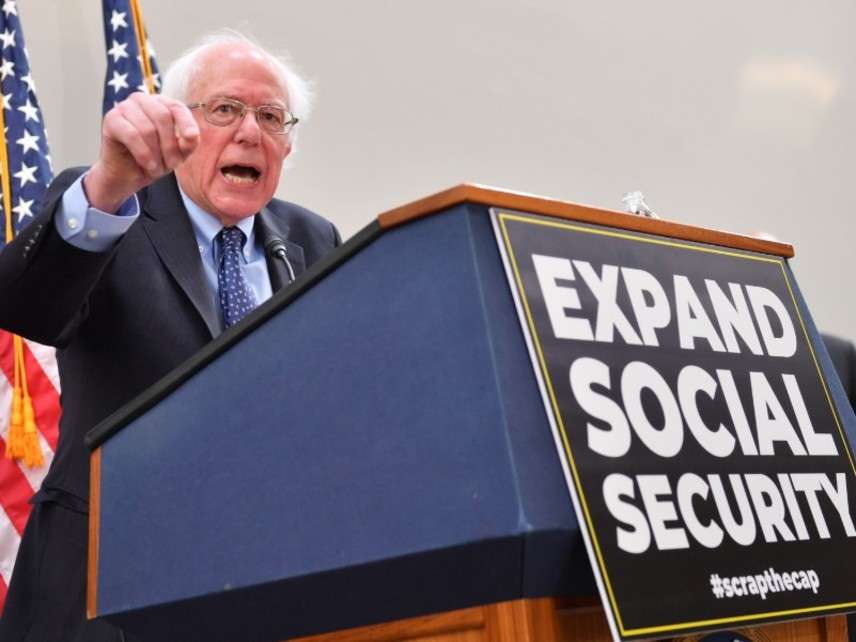Bernie Sanders's 2020 Presidential Agenda Is a Giant Progressive Wishlist
Medicare for All, free college, breaking up the banks, a $15 minimum wage-the Vermont socialist wants to do it all.

Normally when running for president, a candidate chooses one, or perhaps a few, policy areas to prioritize. A campaign may have proposals for any number of other issues, but they tend to be supplementary to the signature ideas. The purpose of such winnowing is twofold. It provides a clear identity for the candidate, focusing both the campaign and voters on a particular message, and it serves as a way of acknowledging the reality that even the most ambitious presidents typically only manage to push through a handful of major policy initiatives.
Bernie Sanders is not a normal presidential candidate, and not only because is a self-declared democratic socialist. The independent Vermont senator, who announced this morning that he would once again run for the Democratic party presidential nomination, appears to be campaigning on a policy agenda that might best be described as a progressive politics "all of the above."
According to The Washington Post, Sanders will not only campaign on the single-payer health care plan he has dubbed Medicare for All. He will also propose a national $15 minimum wage, a massive Green New Deal-style effort to mitigate climate change, the forcible break-up of large financial institutions, paid family leave, leveraging government power to force down drug prices, free public college tuition, ending cash bail and private prisons, legislation to equalize the gender pay gap, reducing corporate election spending, promoting union membership, instituting legal protections for child immigrants, and—and!—expanding Social Security.
Oh, that's all?
To say that implementing such an agenda would be expensive would be to wildly understate its cost and disruptive impact. Sanders' Medicare for All plan would cost about $32 trillion over a decade, according to multiple estimates, which would require more than doubling all individual and corporate income taxes in order to offset. A previous Sanders plan to make tuition at public colleges free would cost the federal government about $47 billion a year. These are just two aspects of his agenda. Viewed as a whole, the Sanders platform amounts to a refusal to accept the possibility of political costs or trade-offs. It is a defiant rejection of practical, realistic thinking, and a plea to not be taken seriously.
Of course, some people do take him seriously. Indeed, Sanders' Gary-Oldman-screaming-"everyone!" approach to agenda-making is probably part of his appeal: He is the rare candidate for higher office who asks for everything. Yet partly because of his do-it-all expansiveness, he will likely get nothing—or very little. Even with a blowout Democratic victory in 2020, it's hard to imagine most of these ideas passing in the Senate. And by emphasizing the totality of his agenda, Sanders has weakened his ability to push for any individual policy change.
Yes, Sanders has been touting many of these ideas for years, and yes, his last campaign for president was similarly overstuffed with what might be generously described as utopian economic policies. And it's also true that the relative success of Sanders' 2016 run helped shape the agendas of the rest of the Democrats' 2020 field. But even with their lurch to the left, those candidates are already downplaying their explicit ties to socialism, and casting Sanders-style ideas such as Medicare for All as aspirational. They are pushing for big policy changes, but they are still, at heart, incremental shifts, focused on a handful of discrete policies, and occasionally even acknowledging that trade-offs might be involved. For all of Sanders' influence on the Democratic party, their campaigns so far are tacit rejections of Sanders-style radicalism.
And in this case, radicalism is the right word. Enacting all or even most of the Sanders agenda would fundamentally transform American life and politics, re-orienting much of the economy around government controlled and funded programs.
Which may be the point. Sanders regularly characterizes his political aims in grandiose terms, focusing less on the effects of specific policies and more on the scale of his ambitions. Announcing his campaign today, he declared that it was about more than beating Donald Trump or "winning the Democratic nomination and the general election." Rather, he said, "Our campaign is about transforming our country and creating a government based on the principles of economic, social, racial and environmental justice." Sanders' priority isn't any particular policy, but the revolution itself.


Show Comments (102)